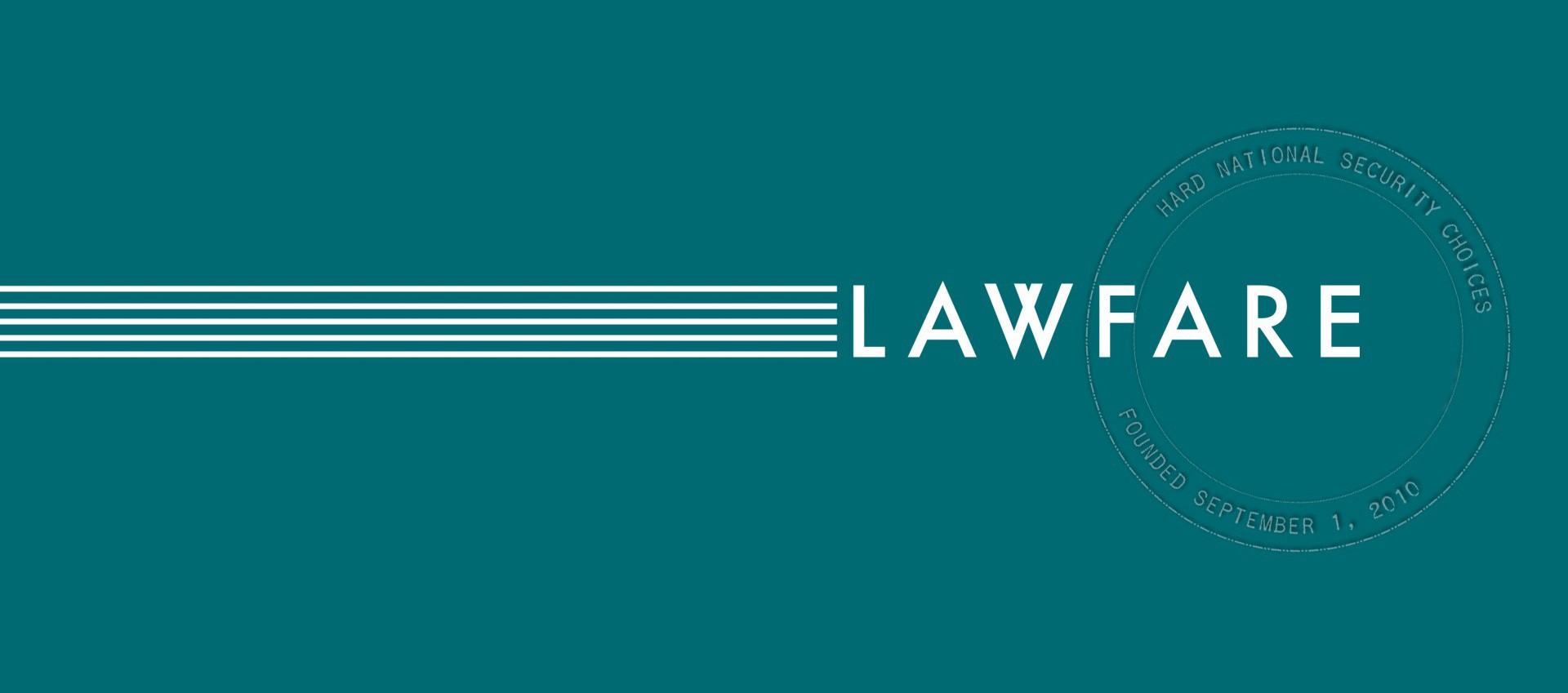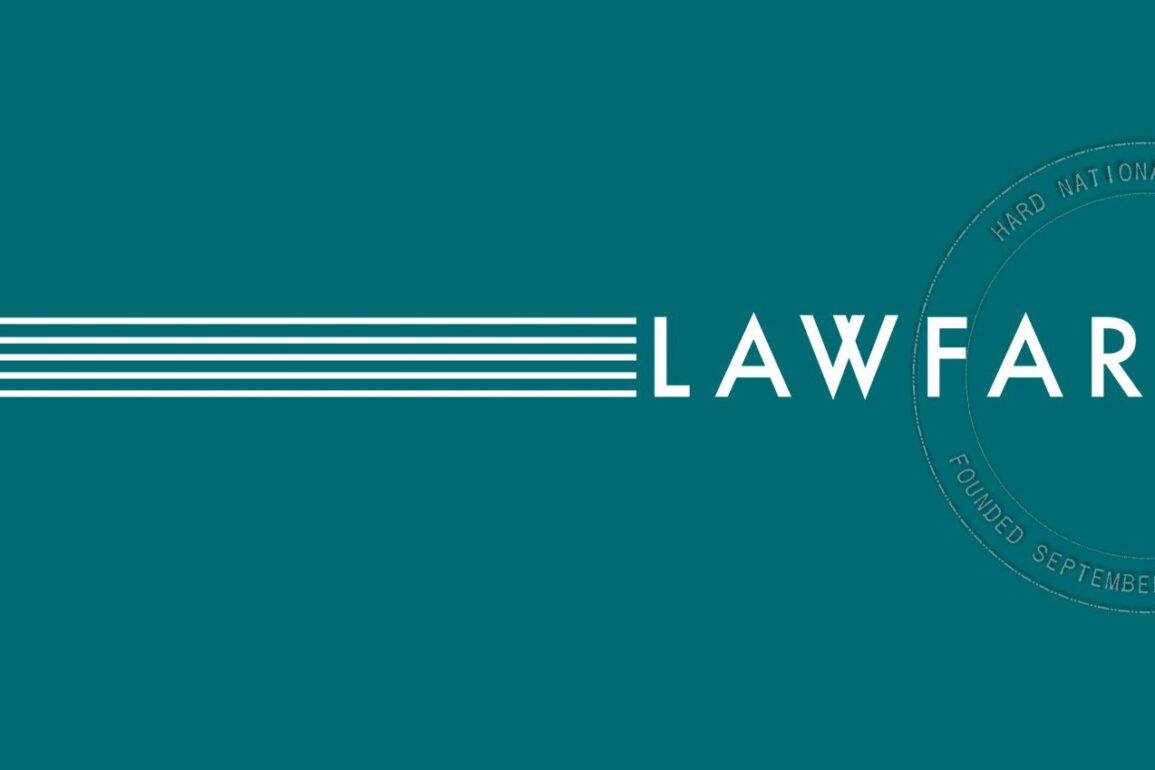
Mai El-Sadany discussed the indictment of Senator Robert Menendez (D-N.J.) on three counts of conspiracy and how it fits into the greater context of Egypt’s record of interference in U.S. foreign policy.
Mark Jia examined how the U.S.-China rivalry is beginning to affect U.S. law, in context of how domestic law has previously changed as a result of the U.S.’s international conflicts.
Brandon L. Van Grack, Charles Capito, James Brower, and Jonathan Babcock discussed the Biden administration’s new program to regulate outbound investments that could threaten U.S. national security: its origins, how it will work, and its key implications.
On the Lawfare Podcast, Scott R. Anderson sat down with Eric Ciaramella and Dara Massicot to discuss Ukraine’s months-long counter offensive, President Zelenskyy’s trip to New York and D.C., and where the conflict is likely headed:
In Lawfare’s Foreign Policy Essay series, Kate Bateman discussed lessons the U.S. should learn from its experience in Afghanistan about marrying military leverage with diplomatic efforts to reach better and faster outcomes to war. She argued that the U.S. should use these lessons in working toward a just peace in Ukraine.
Anna Hickey shared the testimonies of four executive branch officials—Carolina Kass, Christopher Maier, Victoria Nuland, and Richard Visek—who testified in front of the House Foreign Affairs Committee in a Sept. 28 hearing on reforming the 2001 Authorization for Use of Military Force (AUMF).
Loren Voss discussed updates to the Department of Defense’s Law of War Manual—specifically, the establishment of a presumption of civilian status. Voss argued that while the changes are significant, verbiage in other sections of the manual concerning targeting and identification may result in implementation challenges, limiting the impact of the updates.
Caleb Benjamin shared the Privacy and Civil Liberties Oversight Board Report on the Surveillance Program Operated Pursuant to Section 702 of the Foreign Intelligence Surveillance Act (FISA). The report discusses Section 702 implementation and analyzes its value as significant debate surrounds it in the lead-up to its December 2023 expiration date.
Jim Baker discussed proposed changes to FISA Section 702 that seek to limit government overreach. He suggested that a warrant requirement for FISA searches may be impractical and argued that Congress must renew Section 702 regardless of whether a safeguard amendment accompanies the renewal because of the critical nature of the information collected using Section 702 authorization.
Stephanie Pell argued that it’s time for the Justice Department to aid Congress in addressing concerns about FISA Section 702 reform because if it doesn’t, the Biden administration risks losing the critical national security tool altogether.
On the Lawfare Podcast, Benjamin Wittes moderated a Brookings Institution Governance Studies discussion with Homeland Security Under Secretary for Intelligence and Analysis (I&A) Kenneth Wainstein. Wittes and Wainstein had a wide-ranging conversation that covered the lessons of 9/11, how we seem to have forgotten some of them, current congressional efforts to limit I&A’s domestic intelligence-gathering activities, and the need for intelligence-gathering authorities following the Jan. 6 attack. Prior to the discussion, Wainstein gave a speech on the current threat environment and the role of the I&A in confronting it:
On the Lawfare Podcast, Pell sat down with Robert Silvers to discuss the Cyber Safety Review Board’s mission and work, the two reports that the Board has issued, one that it’s currently working on, and a proposal from DHS that seeks to codify the Board into law:
Michael P. Fischerkeller argued that a cyber intrusion on a state’s nuclear enterprise publicized during a geostrategic condition of competition could undermine states’ perceptions of nuclear guarantees and promote nuclear proliferation. He pointed to recent disclosure of North Korean activity and rising concerns from states under the U.S.’s nuclear umbrella as evidence that these consequences are plausible.
On Rational Security, Anderson, Quinta Jurecic, and Alan Rozenshtein sat down to discuss this week’s big national security news stories, including the indictment of Senator Menendez, Judge Tanya Chutkan’s pending decision on a proposed gag order on former President Donald Trump, the House Foreign Affairs Committee hearing on reforming the 2001 AUMF, and more:
On this week’s episode of “Lawfare Live: Trump’s Trials and Tribulations,” Wittes sat down with Anderson, Anna Bower, and Roger Parloff to discuss Judge Chutkan’s order denying Trump’s motion for recusal, Judge Scott McAfee’s order regarding revealing jurors’ identities in the Fulton County case, a New York judge finding Trump liable for fraud, and more:
Hyemin Han shared Judge Chutkan’s order denying Trump’s motion to recuse herself from the Jan. 6 case.
On the Lawfare Podcast, Wittes and Bower sat down with Kenneth Chesebro’s defense attorneys, Scott Grubman, Manny Arora, and Robert Wilson. In a wide-ranging conversation, they discussed why Chesebro demanded a speedy trial, the merits of several pending motions, and the prospect of a settlement in Chesebro’s case:
On the Lawfare Podcast, Anderson sat down with Bower and Parloff to discuss the Jeffrey Clark and fake electors removal hearings, the proposed gag order the government is seeking in the D.C. Circuit court case, updates on cases seeking to remove Trump from ballots under Section 3 of the 14th Amendment, and more:
In the final article of a three-part series on the erosion of India’s judicial independence, Saraphin Dhanani discussed how Prime Minister Narendra Modi’s government has used the judicial system to target political and civil society opposition. Dhanani concluded by suggesting that India’s democracy is not so democratic.
On the Lawfare Podcast, Hickey sat down with Joey Shea to discuss a new Human Rights Watch report that details systematic abuses of Ethiopian migrants and asylum seekers at the Saudi Arabia-Yemen border, how the international community has responded thus far, and the human rights record of Saudi Crown Prince Mohammed bin Salman since he ascended the throne in 2015:
Karin Landgren and Paul Romita highlighted five takeaways from UN Secretary-General António Guterres’s “A New Agenda for Peace” policy brief. They discussed Guterres’s vision for the future of the Security Council and his conception of the evolving threat environment, among other topics.
Liz Arcamona, Louisa Bartolo, Yvonne Lee, and Sarah Shirazyan examined how companies, particularly Instagram, rank and recommend content by explaining the various ranking models and their trade-offs. Arcamona et al. pushed back on accusations that social media companies optimize ranking algorithms simply to improve their bottom line.
On Chatter, David Priess spoke with Erika Nesvold about the JustSpace Alliance that she co-founded and its interactions with space industrialists, conflicting motivations for humanity to settle space, the Outer Space Treaty of 1967, labor law and criminal justice in space settlements, and more:
And Natalie Orpett shared the application for the Lawfare Student Contributor Program for the 2023-2024 academic year. The program allows law students in their second and third years, LLMs, and SJDs (or foreign equivalent) to submit articles and provide research support on issues at the nexus of national security, law, and policy. Applications are due by Oct. 16, 2023. Please apply here.
And that was the week that was.
This post was originally published on this site be sure to check out more of their content.









